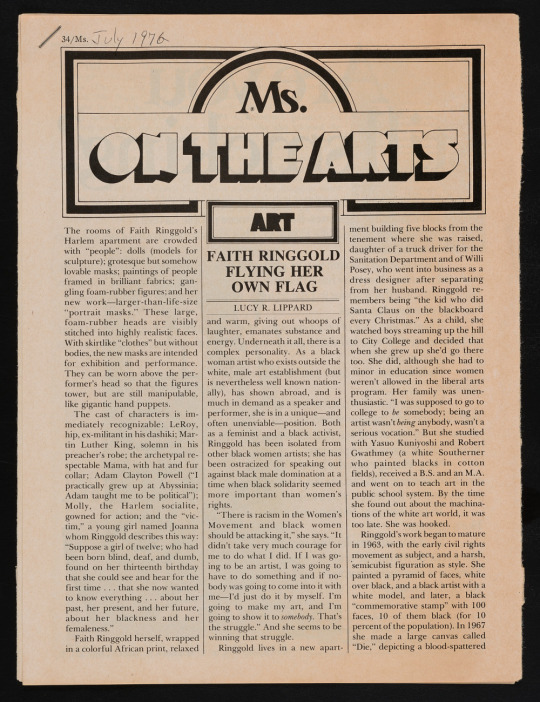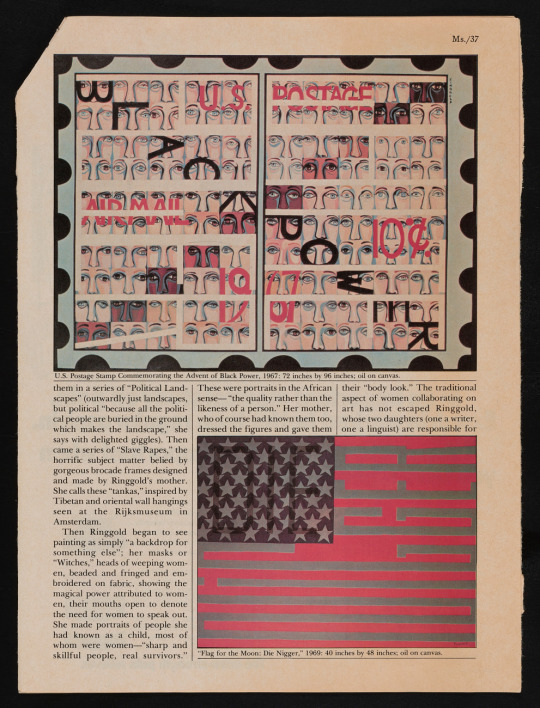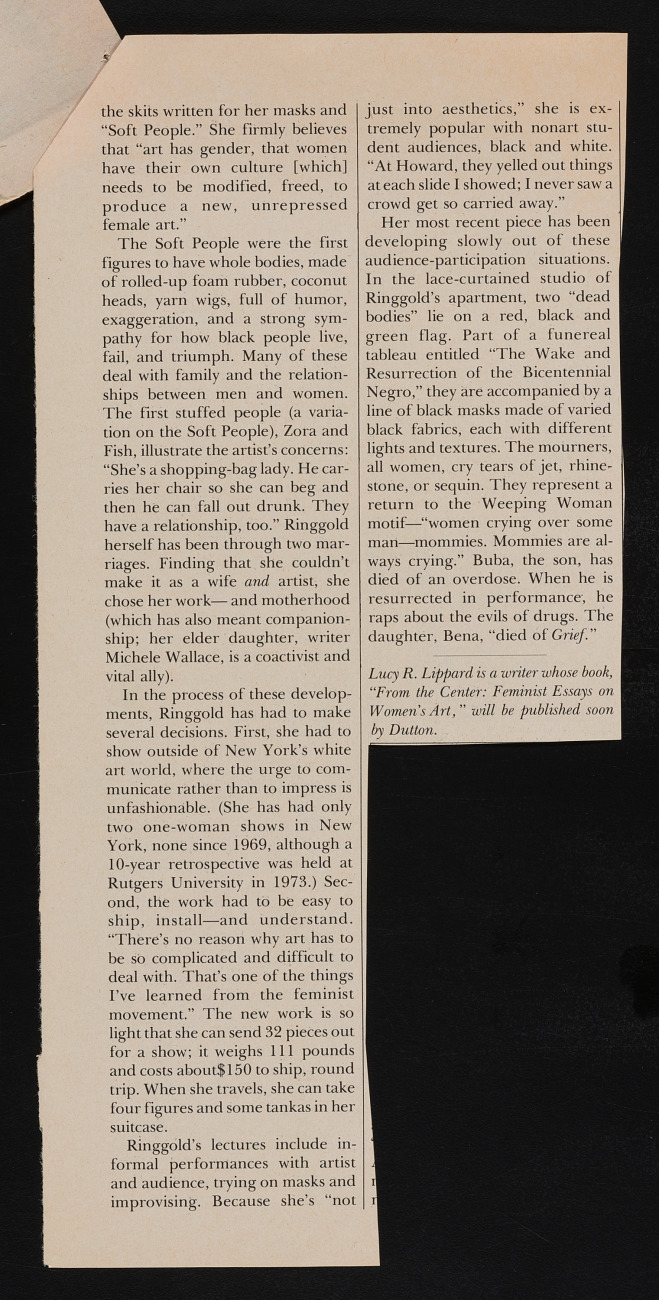#ms. magazine
Explore tagged Tumblr posts
Text




| "Faith Ringgold Flying her own Flag" in Ms. Magazine, July 1976 by Lucy R. Lippard
#Faith Ringgold#black artists#black women artists#black art#article#interview#art#1970s#Ms. magazine#Lucy R. Lippard
40 notes
·
View notes
Text

Michele Wallace with her family: Willi Posey, Theodora Rhino and her mother Faith Ringgold | Selections from Featured Excerpt in Ms. Magazine. Photo by Anthony Barboza
6 notes
·
View notes
Text
How CIA Controls Mass Media, Journalists, Non Profits - CIA 'Legally' Spreads Lies, That Most People Believe, Via The Smith-Mundt Modernization Act, And Operation Mockingbird
Since 2012, CIA Can Legally And Openly Propagandize And Spread Lies To The US Public Originally published 2014, republished 2015; as fundamentally nothing has changed. If anything, things have only gotten worse. CIA Will Now Openly Propagandize Americans CIA CONTROLS THE MEDIA Operation Mockingbird, the CIA’s long term effort to control the news, has shifted into overdrive. On July 2, a…
#CIA#groups#Kennedy Assassination#lies#mass media#Ms. magazine#non profits#nuclear industry#Operation Mockingbird#Project Paper Clip#propaganda
2 notes
·
View notes
Text
…[I]n the spring of 1975, the reconstituted Redstockings went on the offensive in a desperate attempt to reassert radical feminist politics. On May 9, 1975, the group issued a press release accusing Ms. magazine editor Gloria Steinem of having once been involved with a CIA front. Following as it did on the heels of the Alpert controversy, the Redstockings' revelations raised anew the question of feminism's relationship to the state.
This aspect of Steinem's past had already been made public in 1967 when Ramparts magazine revealed that the CIA had subsidized a number of domestic groups including the National Student Association (NSA) and the Independent Research Service (IRS), an organization which Steinem had helped found. The IRS had been established in 1959 to encourage American students to participate in the communist-dominated World Festivals of Youth and Students for Peace and Freedom. Steinem had been the director of the IRS from 1959 through 1960 and had continued to work for the organization through 1962. Redstockings alleged that the CIA established the IRS to organize an anti-communist delegation of Americans to disrupt the festival. They also claimed that Steinem and the IRS had been involved in gathering information on foreign nationals attending the festivals. However, Steinem's own account of the IRS's involvement in the festivals differed dramatically from the Redstockings' version. Shortly after the Ramparts article appeared, The New York Times published an interview with Steinem in which she admitted that she had known about the CIA funding, but claimed that she had never been asked to gather information on Americans or foreigners who participated in the festivals. According to Steinem, the IRS had encouraged Americans to attend the festivals in order to open up the lines of communication between the East and the West. In fact, Steinem maintained that the CIA's involvement was benign, if not enlightened:
“Far from being shocked by this involvement I was happy to find some liberals in government in those days who were far-sighted and cared enough to get Americans of all political views to the festival.”
Steinem asserted that "the CIA's big mistake was not supplanting itself with private funds fast enough."
But Kathie Sarachild, Carol Hanisch, and the other Redstockings members were not only concerned about Steinem's former relationship with a CIA front. They insinuated that Ms. magazine was part of a CIA strategy to replace radical feminism with liberal feminism. Ms. magazine had been a source of irritation to many feminists since its inception. A number of feminist writers were especially angry when Ms. first formed and went outside the movement for its writers and editors. (In fact, Susan Brownmiller, Nora Ephron, and Sally Kempton were struggling to establish a mass-circulation feminist magazine named Jane before Ms. was even conceived. When Brownmiller heard that Elisabeth Forsling Harris wanted to establish a feminist magazine, she suggested to her that the two groups work together. However, Harris reportedly insisted that Steinem was her editor and rejected Brownmiller's offer. Brownmiller's group was forced to scuttle its plans because they could not raise the necessary seed money.) Generally, radical feminists complained of the magazine's liberal orientation and attributed Ms.'s denatured feminism to the magazine's commercial orientation. But Redstockings looked at Ms.'s "curious financing"—Warner Communications put up virtually all the money for the magazine but relinquished corporate control by taking only twenty-five percent of the stock—and asked:
“We are wondering whether all this curious financing is connected to the lesson Gloria Steinem said she learned in 1967: ‘The CIA's big mistake was not supplanting itself with private funds fast enough.’ The Ms. editors should come forward with more information about their unusual stockholders.”
Redstockings contended that the formation of Ms. magazine had given Steinem a strategic position from which "feminist politics can be influenced." And they alleged that “information can and is being gathered on the personal and political activities of women all over the world.”
Steinem, reportedly devastated by the Redstockings' accusations, decided against responding to the charges. However, this decision backfired as some feminists thought her silence suggested that she might, in fact, have something to hide. Betty Friedan, never a big fan of Steinem's, reportedly declared that the CIA had infiltrated the women's movement and called on Steinem to answer the Redstockings' charges. Steinem's vocal support for Alpert and her own refusal to repudiate her past involvement with the IRS made many feminists, like Ellen Willis, curious about her stance on cooperating with the state. In fact, Willis resigned her position as part-time contributing editor at Ms. on June 30, 1975. In her statement of resignation, Willis emphasized that the Redstockings' accusation solidified, but did not precipitate, her decision to resign. Willis explained that she was ending her two-year association with Ms. because of political differences with the magazine—including its promotion of "conservative, anti-left feminism."
-Alice Echols, Daring to Be Bad: Radical Feminism in America: 1967-75
#Alice Echols#feminist history#redstockings#Ms. magazine#gloria steinem#cia#amerika#liberal feminism
14 notes
·
View notes
Text
Ms. Magazine finally did another article on bisexual women in March 2023: on bi health for Bi Health Month.
I'd like to see more frequent coverage of bi+ women in Ms. on & other media platforms. We are a large & growing population.
#ms. magazine#ms magazine#bisexual#bi health#bi health month#bihealthmonth#bisexual health#bi women#bi+ women#bisexual women
16 notes
·
View notes
Text









debates of "positive" vs "negative" images of African Americans. But I take issue with her position that the "quiet dignity" of her character Aibileen Clark in The Help is somehow more complex than what either McDaniel or McQueen did. Aibileen, the "noble servant," is a stock character that placates contemporary white guilt, no less stereotypical than McDaniel and Queen's comedic turns as slave servants in Gone With the Wind, which reassured 1930s whites of their superior racial status.
Rather than put the onus on characters such as Davis to defend their choice to play stock roles and to add "complexity" with their acting, we would do better to take Washington's lead and demand answers of Hollywood filmmakers and movie audiences. Why do certain Black characters resonate for certain communities, why do they keep surfacing decade after decade and why don't we have more diverse representations of Black women in cinema? Davis's fellow Oscar nominees this year portrayed a head of state (Meryl Streep), a cross-dressing butler (Glenn Close), a fragile film icon (Michelle Williams) and a vigilante computer hacker (Rooney Mara). If we have trouble imagining Black women in similar roles, therein lies the problem.
Regardless of the results this Sunday, the choices make clear that Black women's roles have evolved little over 73 years of Hollywood history. Fortunately, independent cinema continues to subvert Hollywood's limitations, just as Black theater did in Washington's time. This year, we've seen masterful works from up-and-coming Black female filmmakers like Ava Duvernay and Dee Rees. And just last year we celebrated the 20th anniversary of Julie Dash's still groundbreaking film Daughters of the Dust. While Hollywood remains stuck in the past, Black audiences may need to look elsewhere to recognize ourselves on film.
0 notes
Text

(×)
362 notes
·
View notes
Text

Carol Danvers as Ms. Marvel by Frank Cho from the cover of Wizard Magazine #199 (2008)
#marvel comics#wizard magazine#frank cho#carol danvers#ms. marvel#captain marvel#marvel 1970s#marvel 2008
252 notes
·
View notes
Text


photography by mayan toledano.
#Mayan toledano#paper magazine#uploads#photography#so pretty#eyes#yatted#no mames#Ms#miss northwest#<3
110 notes
·
View notes
Text


Gael García Bernal interviewed by Dir. Julian Schnabel for Interview Magazine (2003)
📷Ellen von Unwerth
#work ms thing 😌#gael garcía bernal#gael garcia bernal#alain deloin#purple noon#julian schnabel#la mala educacion#ggb interview#ggb quote#post#interview magazine#fine i added a pic . that i still need not as a scan . ellen von unwerth pls share#ellen von unwerth
242 notes
·
View notes
Text

#cuphead#cuphead delicious last course#mugman#ms chalice#chef saltbaker#i specifically bought the edge magazine just to scan these#posting this image from the EDGE Magazine since i couldnt find it anywhere online#the digital version only had the left side available but not the right one#it aint perfect but its honest work#actually i just wanted to see chef saltbaker making pizza yuppie#also they took ms chalices fuckin eyelashes#they are lost in the sauce
81 notes
·
View notes
Text



Electronics MS 1504 Soviet laptop computer
98 notes
·
View notes
Text

Wonder Woman by Murphy Anderson on the cover of Ms. Magazine, 1972
58 notes
·
View notes
Text

Kimi wa Meido-sama. (You Are Ms. Servant.) scans
#meidosama#kimi wa meido sama#you are ms. servant#yuki#animedia magazine#anime scans#official art#anime
45 notes
·
View notes
Text








Rap Reigns Supreme | Vibe Magazine (1998)
#vibe magazine#method man#ll cool j#busta rhymes#lil kim#foxy brown#missy elliott#ms lauryn hill#jay z#master p#hip hop#90s
78 notes
·
View notes